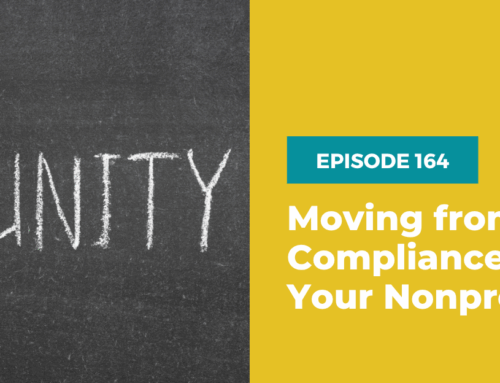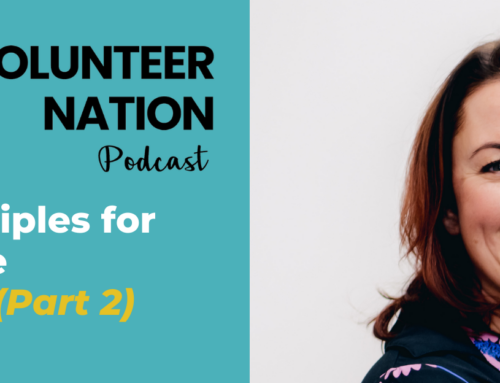
April 11, 2024
Episode #105: 7 Habits of Highly Effective Volunteer Managers
In this episode of the Volunteer Nation podcast, Tobi Johnson explores the seven habits that make volunteer managers highly effective, inspired by Stephen Covey’s famous book ‘The Seven Habits of Highly Effective People.’
Tobi emphasizes the importance of mindset, setting healthy boundaries, strategic thinking, knowing your numbers, sharing the workload, dedicating time to work on your program, and continuously learning and growing. The episode is packed with insights and tips on how volunteer managers can improve their leadership skills and effectively support their organizations and volunteers!
Volunteer Managers – Episode Highlights
- [03:05] – Habit #1: Mind Your Mindset
- [04:12] – Habit #2: Setting Healthy Boundaries
- [05:29] – Habit #3: Being Strategic
- [09:25] – Habit #4: Know Your Numbers
- [12:07] – Habit #5: Share the Load
- [13:49] – Habit #6: Working on Your Program vs. In Your Program
- [19:22] – Habit #7: Sharpening the Saw
- [19:28] – The Essence of Effective Volunteer Management
Volunteer Managers – Quotes from the Episode
“We want to have joy in our work, because what we do is really important and should be celebrated, right? We have to set boundaries to show others how we want to be treated by treating ourselves well first.”
“People evolve, society evolves, and so does volunteerism. We need to always be optimizing and reflective of community priorities. When you take time by working on your program to create efficiencies, you save time in the long run. Sometimes by being more proactive or going slow, you can go faster later.”
Helpful Links
- VolunteerPro Membership Community
- FREE Webinar – How to Become an Irresistible Magnet for Today’s Volunteers
- Steven Covey, The 7 Habits of Highly Effective People: Revised and Updated: 30th Anniversary Edition
- Volunteer Nation Episode #003 – Moving from a Scarcity Mindset to Abundance
- Volunteer Nation Episode #034 – Your Nonprofit Strategic Plan for Volunteers – What to Include
- Volunteer Nation Episode #046 – Save Time with Better Volunteer Management Systems
About the Show
Nonprofit leadership author, trainer, consultant, and volunteer management expert Tobi Johnson shares weekly tips to help charities build, grow, and scale exceptional volunteer teams. Discover how your nonprofit can effectively coordinate volunteers who are reliable, equipped, and ready to help you bring about BIG change for the better.
If you’re ready to ditch the stress and harness the power of people to fuel your good work, you’re in exactly the right place!

Contact Us
Have questions or suggestions for the show? Email us at wecare@volpro.net.
Rate, Review, & Follow Us on Apple Podcasts
If you love the content Tobi shares on the Volunteer Nation podcast, consider rating and reviewing the show! This helps us reach more people – and help more good causes just like yours – successfully engage enthusiastic, dedicated volunteers with less stress and more joy.
Click here, scroll to the bottom, tap to rate with five stars. Then, select “Write a Review” and let us know what you loved most about this episode!
Also, if you haven’t done so already, follow the podcast so you don’t miss a thing. Follow now!
Subscribe to ProNews: Our Weekly Resource Roundup
If you’d like to stay up to date on all new podcasts, blogs, freebies, and deals posted on our Tobi Johnson & Associates and VolunteerPro websites, subscribe to our weekly ProNews newsletter.
Every Wednesday, we’ll send you a digest of our freshest content, plus a bonus! Once you confirm your subscription, you’ll get our [Free eBook] The New Volunteer Manager: The First 90 Days.
Episode #105 Transcript: 7 Habits of Highly Effective Volunteer Managers
Tobi Johnson: Hey everybody, welcome to another episode of the Volunteer Nation podcast. I’m your host, Tobi Johnson, and today I want to talk about the seven habits of highly effective volunteer managers. You’ve heard of the Stephen Covey book, I’m sure, The Seven Habits of Highly Effective People. It’s a New York Times bestseller, over 25 million copies sold. I would love to have a book sell that many.
It’s been called the number one most influential business book of the 20th century. No doubt you’ve heard about it, but I thought we’d flip the script a little bit and just look through a different lens and look at volunteer managers versus people in general. So, let’s take a look, of you’re a volunteer manager, I hope this will inspire you.
If you are a supervisor or leader of a nonprofit or volunteer involving organization. and you are leading others who are leading volunteers, I hope this helps you as well. Think about ways you can support that person even more effectively and what are the areas to look for in terms of their growth and their effectiveness.
So, today it’s all about seven habits of highly effective volunteer managers. But before we get started, I want to ask you something. Have you signed up yet for our upcoming free webinar? How to become an irresistible magnet for today’s volunteers. If you haven’t signed up yet, what are you waiting for?
We’ve got a couple of choices, April 16th or April 19th. You can go to volpro.net/magnet to save your spot. And in this workshop, I’m going to show you how to recruit and retain committed volunteers with the right mix of skills, experiences, and attributes.
Plus, as a bonus, you’ll get access to our brand-new baseline Volunteer Strategies Success Path Assessment. It’s a tool we’ve been working on. We’re very excited to roll it out. And you’ll be able to use that tool online to assess where you’re at and give yourself a score and then pinpoint the areas where you want to put your effort into. So go to volpro.net/magnet to save your spot.
All right, let’s jump into it. Seven habits of highly effective volunteer managers. You’ve no doubt heard of Stephen Covey’s book, as I mentioned, Seven Habits of Highly Effective People. So, let’s take a twist on this and look at it in terms of volunteer managers.
So, the number one habit for volunteer managers is mind your mindset. I talk a lot about this in our volunteer pro membership community, talk a lot about it when I’m coaching folks. We really want to think about fostering a mindset of abundance, possibility, and hope? If you’re looking down all the time, you’re not seeing the opportunities in front of you.
We’ve got to think about our mindset. And if you’re interested in more of this, you can see Volunteer Nation three, Volunteer Nation Episode 3, Moving from a Scarcity Mindset to Abundance. Mindset is so important to me and so important to what I think is of value and really supportive of being effective.
It’s about being able to manage your mind so that you can manage your attitude, so you can manage your results. And as a leader, that’s just so important to us. So, you know. Episode three, I thought it was pretty important. So, I talked about it early, early in the podcast. So, let’s talk about number two habit for volunteer managers, which I think is really important as well, which is setting healthy boundaries.
And what do we mean by boundaries? We mean professional boundaries, boundaries around our time, availability, emotional energy, The number of tasks we put on our list, the turnaround time or promising people, the commitments we make of volunteer talent to other departments in our organization. All those things are boundary setting.
There are other boundaries as well you might think of. We don’t do a very good job, I think, in our field of setting those boundaries, and that can lead to burnout, negativity, and just a lack of joy. We want to have joy in our work, because what we do is important and should be celebrated, right? So, we must set boundaries to show others how we want to be treated by treating ourselves well first. And so, we’ve got to share with people what treating us looks like, what treating us well looks like. So, setting boundaries is a way to do that. So that’s my second habit, volunteer managers. Let’s go on to the third habit. My third habit for volunteer managers, important.
Something we all need to learn how to do more effectively, and that is to be strategic. I have some things I don’t do well and some things I do well, like everyone, you know, some of you have things that are your zone of genius and some things that are not your zone of genius. I have plenty of things that are not my zone of genius, but one of my zones of genius is being strategic.
It’s one of the things, and I don’t really, I can’t figure out how I learned it, but it is something that I do well. This is something that I think volunteer managers as a whole need to be able to do well as well. And really, Thank you. What I mean by strategic is that those high-level objectives or goals.
So, are they being, specifically around volunteer management, are the goals of the volunteer service department, and could be a department of one, could not even be a department, could be a part time job for somebody. But is the volunteer strategy mapped to the larger organization’s goals? We talk a lot about this when we do our annual strategic planning boot camp vision week.
And it’s surprising to people how often it isn’t the case that there is not a direct line that at some point in the organization’s evolution, there was a disconnect between what volunteers are doing and what the organization’s current priorities are. So, the key, you know, folks talk about not getting bought in from leadership.
Well, the key to buying in is ensuring that others know precisely how volunteer work contributes to your bottom line, whether it’s financially, in terms of productivity, in terms of talent and skill set. It could be a lot of ways that you’re contributing. And what are those key priorities for your organization?
And how are volunteers being leveraged? towards those. Don’t think we do a good enough job of this. Plenty to do around it. And if you want to think more about how to build a strategic plan for volunteer services, check out Volunteer Nation Episode 34, your nonprofit strategic plan for volunteers, what to include, and I’ll put these links in the show notes.
But if you want to learn more, if you’re really interested in working on this number three habit for volunteer managers of being strategic, this episode will really help you out. All right let’s take a pause for a quick break from my curated list of the seven habits of highly effective volunteer managers.
So don’t go anywhere. If you’re enjoying this week’s episode of Volunteer Nation, we invite you to check out the Volunteer Pro Premium Membership. This community is the most comprehensive resource for attracting, engaging, and supporting dedicated high impact volunteer talent for your good cause.
Volunteer Pro Premium Membership. Helps you build or renovate an effective what’s working now, volunteer program with less stress and more joy. So, you can ditch the overwhelm and confidently carry your vision forward. And it’s the only implementation program of its kind that helps your organization build maturity across five phases of our proprietary system, the volunteers strategy success path. If you’re interested in learning more, visit volpro.net/join
Okay, we’re back with my curated list of the seven habits of highly effective volunteer managers. We’re on to habit number four. The three habits that I shared before the break were, number one was mind your mindset.
Number two was setting healthy boundaries. Number three was being strategic. Number four, Know your numbers. Know your numbers. You know, there’s different types of data we collect or can collect as leaders of volunteers and volunteers involving organizations. Some are formative. The data gives us information about what’s going to happen.
It helps us predict. These numbers are precursors of success. For example, think about volunteer satisfaction ratings. If volunteers are happy, they’re more likely to stay around and we’re more likely to have higher volunteer capacity. So, volunteer satisfaction ratings are formative. They’re sort of those predictors of success.
We also have numbers and data that, uh, are summative. Our outcome metrics or the data that we collect, the numbers that we collect are summative. And that means that it’s after the fact. It tells us what happened in the rearview mirror. These types of summative data might be percentage of roles that were filled in the last quarter of the open roles, the available roles for volunteers, what percentage of those were filled.
If you’re a volunteer manager, it’s important to know some of these numbers around your capacity and to know a mix of your formative and summative. So, what predicts success and what has happened in the rearview mirror? You know, data is the language of leadership, whether you’re speaking to your board, you’re speaking to your leadership, and you as nonprofit leaders, if you’re listening, you know this is the case and it is the language of speaking to grantors and funders as well, to be able to talk about impact is to talk in numbers.
These numbers also help you counter assumptions because you can back up what people are assuming with hard data and you can either say, yep, that’s correct, the data shows that, or nope, that’s not correct because the data doesn’t show that. And so, there’s lots of different things to collect data around, but it’s important to know those.
As a leader of volunteers, you need to know your baseline data. So, for the past quarter or year to date, what’s going on and be able to be fluent with that, be able to, when I ask people, how many active volunteers do you have? Well, as of last month, we have X number of active volunteers. What’s your annual retention rate?
What’s your monthly churn rate? These are numbers that we should know out of our back pocket. So, big habit number four, not an easy habit to get into. It’s not our favorite thing. A lot of us who are in the people business don’t like numbers, but it’s something that we need to learn how to do well. All right, let’s look at habit number five for volunteer managers, share the load.
Now this seems like a no-brainer for a sector whose number one job is to deploy talent and to bring people in. But. Volunteer managers are sometimes the last people to bring volunteers into their own work and into their own department. So, think about your goal of continuously creating leaders. Really when we bring volunteers in from the community, we need to always think, what can I delegate?
How can I create leadership? How can I foster volunteer leadership? Rather than first thinking, how do I need to do this myself? Because that’s not what we’re in the business of doing. What we’re in the business of doing is bringing the community in. And deploying them and giving them the opportunity to contribute to change in the kinds of changes that they’re interested in.
We are offering opportunities. When we take the work and do it for ourselves, even if it’s administrative work, that’s still contributing to the organization’s capacity to meet the mission. Everything we do in our nonprofits, because we don’t have a lot of extra time and energy, Contributes to our bottom line, to our mission, and so when we don’t allow volunteers to help us in those ways, we are removing opportunity that we could offer people in our communities to help us move our missions forward, and so sharing the load is an important habit, and it’s number five in my list.
Number six habit is setting aside dedicated time to work on your program versus in your program. And last week, I led our quarterly planning intensively with some of our volunteer pro paid community members. And we do this every quarter at the end of the quarter for the coming 90-day cycle. sprint. And we go through and think through how, how did things go?
How are we moving forward? We have a framework that we look at, we look at our big rocks, what are we trying to achieve? We align it with our strategic plan. And we really are purposeful about how we’re spending our next 90 days (about 3 months). And so, we really want to set aside time like this. In this example, it is working on your program versus in your program or on your strategy versus in your strategy.
You know, working in your program is about being reactive. It’s about getting pulled away from the program development and the continual program development that we need to be involved in. You know, we really need to be always optimizing our volunteer systems and our volunteer engagement strategies because the world is evolving around us, and we are in the people business.
People evolve, society evolves, and so too does volunteerism, so we need to always be optimizing and being reflective of community priorities. When you take time by working on your program to create efficiencies, you save time in the long run. So sometimes by being more proactive or going slow, you can go faster later.
I’m a big component of working on your program versus in your program. It’s a, you know, it’s really a sign of maturity to transition from short-term thinking and putting out fires to long term thinking. and building capacity. And it’s difficult. I’m not saying it’s easy. It’s very difficult when there are juggling priorities and people are coming into your office and there’s a lot of drama or chaos happening.
It’s very hard to set aside this time, but you’ve got to continually try to make it happen for yourself. And if you don’t have time, go back to habit number five, share the load. It’s time to get volunteers more involved in leading other volunteers. So that was my habit number six. And if you check out Volunteer Nation episode 46, save time with better volunteer management systems,this will give you some ideas of things you might want to work on, not in, right?
Let’s talk about number seven, my final habit for volunteer managers, and that is direct from Stephen Covey. In his seven habits of highly effective people, he talks about sharpening the saw, sharpening the saw so that you can cut more efficiently, that you need to use less back and forth motions to cut through a piece of wood.
Right? You have that sharp saw, it’s very efficient, effective, cuts things like butter, right? Well, part of that is about learning and growing and continuing to level up your skill set. And, you know, if you’re not uncomfortable, you’re probably not stretching enough. And I was just talking to a group I was coaching, and, you know, they’re feeling uncomfortable with what they’re learning.
They’re starting to, not figuratively, I like to call it figuratively hyperventilating, they’re not actually hyperventilating, but in the call, I could feel that they were very, figuratively. very agitated. And they were worried they weren’t keeping up and they weren’t doing what they needed to do. And they, they were lacking confidence.
They were starting to lose confidence in their ability to get the work done and make what happened happen, which is our volunteer recruitment strategy. And I, you know, calmed everybody down. I said, look, you’re growing. You’re learning new things. Of course it’s going to be uncomfortable. You’ve never even done this before.
So, it’s going to be uncomfortable. You know, I remember the first time I learned how to snow ski. I fell down a lot. It wasn’t comfortable to fall on hard packed snow, especially the icy snow here in the Pacific Northwest. We’re not talking powder people. It’s icy and uncomfortable. And by the end of the day, you’re sore.
You know, I was a little kid, and I can still remember how difficult it was for me to learn how to ski. And so, if we’re not growing, if we’re not feeling any pain at all, if we’re not uncomfortable at least, you don’t have to feel physical pain obviously, but if you’re not feeling uncomfortable, you’re probably not pushing yourself to grow.
And so, sharpening the saw is not only seeking out ways to level up, but it’s also being willing to be uncomfortable for a little bit as you get your sea legs, as you figure out how to move forward. And that’s what we do here. And we see a volunteer pro. We see people go through this process and build confidence and then try something again that’s difficult and build confidence about that and try something again and build confidence about that. That’s what it is. That’s what real growth as a professional look like. That’s why number seven for me, for volunteer managers, the number seven habit is sharpening the saw.
This has been a fun episode to put together, kind of creative and just fun to think about what it is that is essential what, you know, when I was thinking about these seven habits, I just thought to myself, if I were to create my own seven habits for effective volunteer managers, what would they be? And I started to think about it. What do I think is the top priority? And it’s not about how to write a better position description, y’all.
That’s not what it’s about. It’s about leadership. It’s about learning to manage ourselves before we manage others. It’s about mindset. It’s about strategy. Those are the things that are important that will help move the needle. So let me review these seven habits of highly effective volunteer managers before we close.
Habit number one, mind your mindset. Habit number two, set healthy boundaries. Habit number three, be strategic. Habit number four, know your numbers. Habit number five, share the load. Habit number six, set aside dedicated time to work on your program. And habit number seven, sharpen the saw. And of course, if you’re interested in sharpening your saw, Volunteer Pro is right here.
We have our Volunteer Management Fundamentals course. We have our Volunteer Pro membership community. And coming up, we have our upcoming free webinar next week on how to become an irresistible magnet for today’s volunteers. So, you can come to that for free and sharpen your saw. So come join us at volpro.net/magnet for that webinar. And I hope to see you there. So, take care, everybody. I hope you’ve enjoyed this episode. If you liked it, share it with a friend, and I’ll see you next week. Same time, same place on The Volunteer Nation. Take care, everybody.






